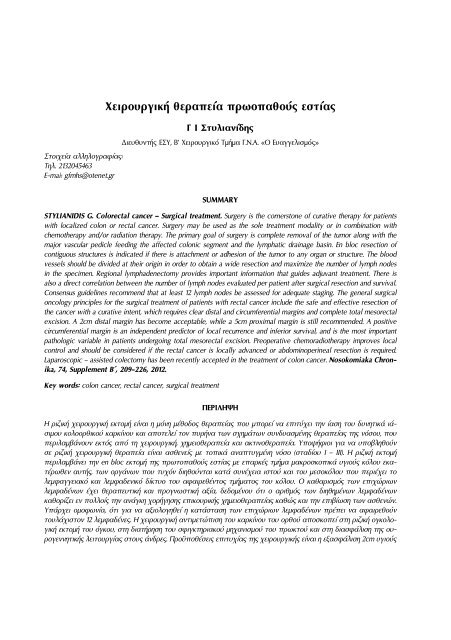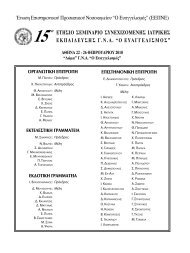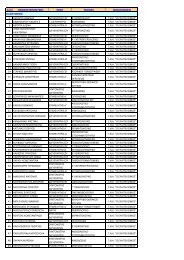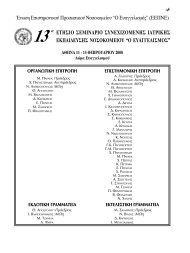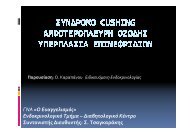ÏÏ Î¼ÏληÏÏμαÏικο ÏÎµÏ ÏÎ¿Ï 2
ÏÏ Î¼ÏληÏÏμαÏικο ÏÎµÏ ÏÎ¿Ï 2
ÏÏ Î¼ÏληÏÏμαÏικο ÏÎµÏ ÏÎ¿Ï 2
Create successful ePaper yourself
Turn your PDF publications into a flip-book with our unique Google optimized e-Paper software.
Χειρουργική θεραπεία πρωοπαθούς εστίας<br />
Γ Ι Στυλιανίδης<br />
Διευθυντής ΕΣΥ, Β’ Χειρουργικό Τμήμα Γ.Ν.Α. «Ο Ευαγγελισμός»<br />
Στοιχεία αλληλογραφίας:<br />
Τηλ. 2132045463<br />
E-mai: gfmhs@otenet.gr<br />
SUMMARY<br />
STYLIANIDIS G. Colorectal cancer – Surgical treatment. Surgery is the cornerstone of curative therapy for patients<br />
with localized colon or rectal cancer. Surgery may be used as the sole treatment modality or in combination with<br />
chemotherapy and/or radiation therapy. The primary goal of surgery is complete removal of the tumor along with the<br />
major vascular pedicle feeding the affected colonic segment and the lymphatic drainage basin. En bloc resection of<br />
contiguous structures is indicated if there is attachment or adhesion of the tumor to any organ or structure. The blood<br />
vessels should be divided at their origin in order to obtain a wide resection and maximize the number of lymph nodes<br />
in the specimen. Regional lymphadenectomy provides important information that guides adjuvant treatment. There is<br />
also a direct correlation between the number of lymph nodes evaluated per patient after surgical resection and survival.<br />
Consensus guidelines recommend that at least 12 lymph nodes be assessed for adequate staging. The general surgical<br />
oncology principles for the surgical treatment of patients with rectal cancer include the safe and effective resection of<br />
the cancer with a curative intent, which requires clear distal and circumferential margins and complete total mesorectal<br />
excision. A 2cm distal margin has become acceptable, while a 5cm proximal margin is still recommended. A positive<br />
circumferential margin is an independent predictor of local recurrence and inferior survival, and is the most important<br />
pathologic variable in patients undergoing total mesorectal excision. Preoperative chemoradiotherapy improves local<br />
control and should be considered if the rectal cancer is locally advanced or abdominoperineal resection is required.<br />
Laparoscopic – assisted colectomy has been recently accepted in the treatment of colon cancer. Nosokomiaka Chronika,<br />
74, Supplement Β΄, 209-226, 2012.<br />
Key words: colon cancer, rectal cancer, surgical treatment<br />
ΠΕΡΙΛΗΨΗ<br />
Η ριζική χειρουργική εκτομή είναι η μόνη μέθοδος θεραπείας που μπορεί να επιτύχει την ίαση του δυνητικά ιάσιμου<br />
κολοορθικού καρκίνου και αποτελεί τον πυρήνα των σχημάτων συνδυασμένης θεραπείας της νόσου, που<br />
περιλαμβάνουν εκτός από τη χειρουργική, χημειοθεραπεία και ακτινοθεραπεία. Υποψήφιοι για να υποβληθούν<br />
σε ριζική χειρουργική θεραπεία είναι ασθενείς με τοπικά αναπτυγμένη νόσο (σταδίου Ι – ΙΙΙ). Η ριζική εκτομή<br />
περιλαμβάνει την en bloc εκτομή της πρωτοπαθούς εστίας με επαρκές τμήμα μακροσκοπικά υγιούς κόλου εκατέρωθεν<br />
αυτής, των οργάνων που τυχόν διηθούνται κατά συνέχεια ιστού και του μεσοκόλου που περιέχει το<br />
λεμφαγγειακό και λεμφαδενικό δίκτυο του αφαιρεθέντος τμήματος του κόλου. Ο καθαρισμός των επιχώριων<br />
λεμφαδένων έχει θεραπευτική και προγνωστική αξία, δεδομένου ότι ο αριθμός των διηθημένων λεμφαδένων<br />
καθορίζει εν πολλοίς την ανάγκη χορήγησης επικουρικής χημειοθεραπείας καθώς και την επιβίωση των ασθενών.<br />
Υπάρχει ομοφωνία, ότι για να αξιολογηθεί η κατάσταση των επιχώριων λεμφαδένων πρέπει να αφαιρεθούν<br />
τουλάχιστον 12 λεμφαδένες. Η χειρουργική αντιμετώπιση του καρκίνου του ορθού αποσκοπεί στη ριζική ογκολογική<br />
εκτομή του όγκου, στη διατήρηση του σφιγκτηριακού μηχανισμού του πρωκτού και στη διασφάλιση της ουρογεννητικής<br />
λειτουργίας στους άνδρες. Προϋποθέσεις επιτυχίας της χειρουργικής είναι η εξασφάλιση 2cm υγιούς


